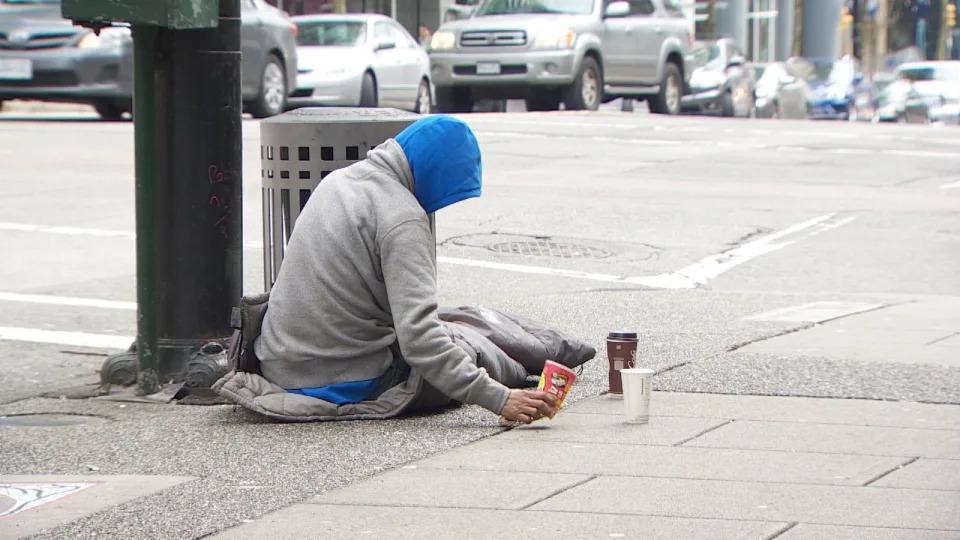CBC
Mon, September 25, 2023

Many municipalities in the province including Trois-Rivières, Granby and Sherbrooke have similar bylaws that penalize panhandling. Michel Bolduc, who is not the person seen in the above photo, received a fine of $226.
(Dillon Hodgin/CBC - image credit)
Two hundred and twenty-six dollars.
That's how much Michel Bolduc was fined for panhandling on the streets of Quebec City last September.
Bolduc, who is 65 years old and living off his Old Age Security pension, was sitting on the sidewalk with a plastic cup in hands, raising it toward passersby who were walking past him when police officers handed him a ticket.
By asking for change, he had violated the city's bylaw on keeping the peace and public order, which forbids soliciting, begging and loitering in a public space.
"It's to feed myself, that's why I do it," Bolduc said. "I can't pay that…I don't find it right. "
One year later, Bolduc still hasn't paid the "degrading" fine. He is challenging the ticket in municipal court. He argues the fine is a violation of his rights enshrined in the Canadian Charter of Rights and Freedoms.
Panhandling is a "survival strategy," a recognized means of getting the basic necessities of life, said Florence Boucher-Cossette, the lawyer representing Bolduc. He was peacefully engaging with other citizens, just trying to get through the end of the month, she said.
According to Boucher-Cossette, the bylaw violates three different sections of the Charter by discriminating against him because he is poor and by infringing upon Bolduc's right to freedom of expression and his right to life, liberty and security.

Florence Boucher-Cossette, the lawyer representing Michel Bolduc, says ticket violates Bolduc's rights enshrined in the Canadian Charter of Rights and Freedoms.
Florence Boucher-Cossette, the lawyer representing Michel Bolduc, says the ticket he received violates Bolduc's Canadian Charter rights. (Submitted by Carla de la Héronnière.)
"Fining poor people because they are poor does not work at all. In fact, it's such a burden that keeps them in poverty. They can be completely submerged in those fines. I've had clients who have received, I kid you not, $70,000 [in fines] in Quebec City," Boucher-Cossette told Quebec AM host Émilie Warren.
"You can never recover from that kind of debt. It's completely absurd," she said, adding that some people living in poverty — or even experiencing homelessness — can be jailed in Quebec City if they don't pay their fines for solicitation.
Quebec City isn't alone.
Many municipalities in the province including Trois-Rivières, Granby and Sherbrooke all have similar bylaws, she says, which means the result of the case could have implications beyond the province's capital.
What makes Quebec City stand out, she says, is the bylaw's broad application which could lead to someone being penalized for loitering or even asking a stranger to light a cigarette.

'Handing out tickets doesn't stop people from being in extreme poverty and trying to meet their basic needs, one way or another,' said Josiane Mondou, social worker at Clinique Droit de Cité.
'Handing out tickets doesn't stop people from being in extreme poverty and trying to meet their basic needs, one way or another,' said Josiane Mondou, a social worker at Clinique Droit de Cité. (Submitted by Frédéric Côté.)
Stop criminalizing poverty, social worker says
Josiane Mondou has seen many cases like Bolduc's.
She works as social worker at Clinique Droit de cité, a community organization in Quebec CIty that defends the rights of marginalized people. Mondou said more than 850 people — many who are unhoused or struggling with poverty, sometimes in addition to health and addiction issues — have reached out since 2015, mostly for getting tickets for solicitation.
Not only does ticketing someone for panhandling give them a negative experience of law enforcement, but it can affect a person's ability to afford a meal or find a place to sleep, she said.
She also said the people she works with are unable to pay the tickets, meaning the fines accumulate additional penalties, sometimes for months and years.
"Handing out tickets doesn't stop people from being in extreme poverty and trying to meet their basic needs," said Mondou.
"We're giving tickets to people whom we know can't pay them because of their financial and life situations. We're putting this on their shoulders, the stress that comes with debt."
She's urging the city to work with experts in public health and prevention to find non-punitive alternatives.
"At all levels, we have to find strategies that don't criminalize poverty," Mondou said.
The Service de police de la Ville de Québec (SPVQ) told CBC it could not comment on the case before the court , but did say that issuing a ticket is a "last resort."
CBC requested comment from the city of Quebec but has yet to receive a response.
Two hundred and twenty-six dollars.
That's how much Michel Bolduc was fined for panhandling on the streets of Quebec City last September.
Bolduc, who is 65 years old and living off his Old Age Security pension, was sitting on the sidewalk with a plastic cup in hands, raising it toward passersby who were walking past him when police officers handed him a ticket.
By asking for change, he had violated the city's bylaw on keeping the peace and public order, which forbids soliciting, begging and loitering in a public space.
"It's to feed myself, that's why I do it," Bolduc said. "I can't pay that…I don't find it right. "
One year later, Bolduc still hasn't paid the "degrading" fine. He is challenging the ticket in municipal court. He argues the fine is a violation of his rights enshrined in the Canadian Charter of Rights and Freedoms.
Panhandling is a "survival strategy," a recognized means of getting the basic necessities of life, said Florence Boucher-Cossette, the lawyer representing Bolduc. He was peacefully engaging with other citizens, just trying to get through the end of the month, she said.
According to Boucher-Cossette, the bylaw violates three different sections of the Charter by discriminating against him because he is poor and by infringing upon Bolduc's right to freedom of expression and his right to life, liberty and security.

Florence Boucher-Cossette, the lawyer representing Michel Bolduc, says ticket violates Bolduc's rights enshrined in the Canadian Charter of Rights and Freedoms.
Florence Boucher-Cossette, the lawyer representing Michel Bolduc, says the ticket he received violates Bolduc's Canadian Charter rights. (Submitted by Carla de la Héronnière.)
"Fining poor people because they are poor does not work at all. In fact, it's such a burden that keeps them in poverty. They can be completely submerged in those fines. I've had clients who have received, I kid you not, $70,000 [in fines] in Quebec City," Boucher-Cossette told Quebec AM host Émilie Warren.
"You can never recover from that kind of debt. It's completely absurd," she said, adding that some people living in poverty — or even experiencing homelessness — can be jailed in Quebec City if they don't pay their fines for solicitation.
Quebec City isn't alone.
Many municipalities in the province including Trois-Rivières, Granby and Sherbrooke all have similar bylaws, she says, which means the result of the case could have implications beyond the province's capital.
What makes Quebec City stand out, she says, is the bylaw's broad application which could lead to someone being penalized for loitering or even asking a stranger to light a cigarette.

'Handing out tickets doesn't stop people from being in extreme poverty and trying to meet their basic needs, one way or another,' said Josiane Mondou, social worker at Clinique Droit de Cité.
'Handing out tickets doesn't stop people from being in extreme poverty and trying to meet their basic needs, one way or another,' said Josiane Mondou, a social worker at Clinique Droit de Cité. (Submitted by Frédéric Côté.)
Stop criminalizing poverty, social worker says
Josiane Mondou has seen many cases like Bolduc's.
She works as social worker at Clinique Droit de cité, a community organization in Quebec CIty that defends the rights of marginalized people. Mondou said more than 850 people — many who are unhoused or struggling with poverty, sometimes in addition to health and addiction issues — have reached out since 2015, mostly for getting tickets for solicitation.
Not only does ticketing someone for panhandling give them a negative experience of law enforcement, but it can affect a person's ability to afford a meal or find a place to sleep, she said.
She also said the people she works with are unable to pay the tickets, meaning the fines accumulate additional penalties, sometimes for months and years.
"Handing out tickets doesn't stop people from being in extreme poverty and trying to meet their basic needs," said Mondou.
"We're giving tickets to people whom we know can't pay them because of their financial and life situations. We're putting this on their shoulders, the stress that comes with debt."
She's urging the city to work with experts in public health and prevention to find non-punitive alternatives.
"At all levels, we have to find strategies that don't criminalize poverty," Mondou said.
The Service de police de la Ville de Québec (SPVQ) told CBC it could not comment on the case before the court , but did say that issuing a ticket is a "last resort."
CBC requested comment from the city of Quebec but has yet to receive a response.
No comments:
Post a Comment